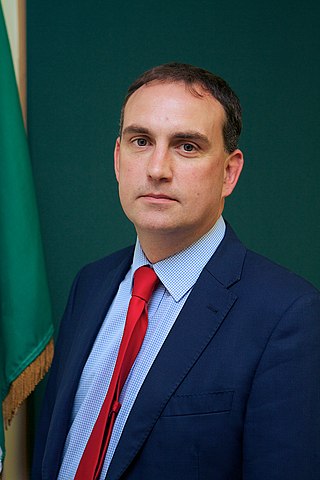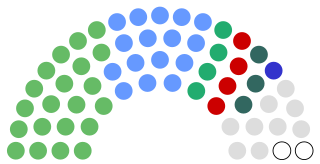John James Boland was an Irish Fine Gael politician who served as Minister for Health from January 1987 to March 1987, Minister for the Environment from 1986 to 1987, Minister for the Public Service from 1982 to 1986 and Minister for Education from 1981 to 1982. He served as a Teachta Dála (TD) from 1977 to 1989. He also served as a Senator for the Labour Panel from 1969 to 1977.
The Seventh Amendment of the Constitution Act 1979 is an amendment to the Constitution of Ireland that provides that the procedure for the election of six members of the Senate in the university constituencies could be altered by law. It was approved by referendum on 5 July 1979 and signed into law on 3 August of the same year.
In Ireland, direct elections by universal suffrage are used for the President, the ceremonial head of state; for Dáil Éireann, the house of representatives of the Oireachtas or parliament; for the European Parliament; and for local government. All elections use proportional representation by means of the single transferable vote (PR-STV) in constituencies returning three or more members, except that the presidential election and by-elections use the single-winner analogue of STV, elsewhere called instant-runoff voting or the alternative vote. Members of Seanad Éireann, the second house of the Oireachtas, are partly nominated, partly indirectly elected, and partly elected by graduates of particular universities.
Jim Walsh is an Irish former Fianna Fáil politician and member of Seanad Éireann from 1997 to 2016.
Mervyn Taylor was an Irish Labour Party politician who served as Minister for Equality and Law Reform from 1993 to 1994 and from 1994 to 1997. He served as a Teachta Dála (TD) for the Dublin South-West constituency from 1981 to 1997. He was the first ever Jewish cabinet minister in Ireland.
John Francis O'Connell was an Irish Labour Party, independent and Fianna Fáil politician who served as Minister for Health from 1992 to 1993 and Ceann Comhairle of Dáil Éireann from 1981 to 1982. He served as a Teachta Dála (TD) from 1965 to 1987 and from 1989 to 1993. He served as a Member of the European Parliament (MEP) for the Dublin constituency from 1979 to 1981. He was a Senator from 1987 to 1989, after being nominated by the Taoiseach.

Marc MacSharry is an independent, formerly Fianna Fáil, politician who is a Teachta Dála (TD) for Sligo–Leitrim since 2016. From 2002 to 2016, he was a Fianna Fáil Senator on the Industrial and Commercial Panel. He resigned from Fianna Fáil's parliamentary party in September 2021, alleging double standards. He resigned his Fianna Fáil membership in November 2022, amid claims he had bullied colleagues.
Feargal Quinn was an Irish businessman, politician and television personality. He founded the Superquinn supermarket chain and served as a Senator for the National University constituency from 1993 to 2016.

The Local Government Act 2001 was enacted by the Oireachtas on 21 July 2001 to reform local government in the Republic of Ireland. Most of the provisions of the Act came into operation on 1 January 2002. The act was a restatement and amendment of previous legislation, which was centred on the Local Government (Ireland) Act 1898. The 2001 act remains in force, although significantly amended by the Local Government Reform Act 2014.

Rónán Thomas Mullen is an Irish senator and former delegate to the Council of Europe. He is the leader of the Human Dignity Alliance, an anti-abortion political party formed in 2018. He was elected by the National University Seanad constituency in July 2007 and re-elected in 2011, 2016 and 2020. He has topped the poll in every NUI Seanad election since 2011. Mullen is a frequent media commentator on social and political topics. The first National University of Ireland senator appointed to the Council of Europe, he received international coverage for his role in defeating the controversial McCafferty Report which sought to limit the right to conscientious objection for medical staff in the case of abortions.

Michael William D'Arcy is the chief executive of the Irish Association of Investment Management. He is an Irish former Fine Gael politician who was elected to the Seanad for the Agricultural Panel in April 2020. He was a Teachta Dála (TD) for the Wexford constituency from 2016 to 2020, and previously between 2007 and 2011. He served as Minister of State at the Department of Finance from 2017 to 2020. He previously served as a Senator for the Administrative Panel from 2011 to 2016.
There are 60 seats in Seanad Éireann, the senate of the Oireachtas. Its composition is set out in Article 18 of the Constitution of Ireland. This provides for 11 senators to be nominated by the Taoiseach who is appointed next after the general election to Dáil Éireann.

Seanad Éireann is the senate of the Oireachtas, which also comprises the President of Ireland and Dáil Éireann.
Maev-Ann Wren is an Irish economist, journalist, author, and former special advisor to the Minister of State at the Department of Health, Roisin Shortall. She is the former economics editor of The Irish Times newspaper. Wren has written two books about the Irish health system and her writings have often been mentioned during Dáil and Seanad debates, and in parliamentary committee. She has been described in the Seanad as "a recognised expert on health care."

John Gilroy is an Irish Labour Party politician. He was elected to the 24th Seanad in April 2011 on the Cultural and Educational Panel. He was previously a member of Cork County Council from 2004 to 2011 for the Blarney local electoral area. He was an unsuccessful candidate at the 2011 general election for the Cork North-Central constituency, polling 6,125 first preference votes (11.7%).

Sean Declan Conrad Barrett is an Irish economist and former senator. He was a senior lecturer in the Department of Economics of Trinity College Dublin, and a Fellow of the college. In April 2011, he was elected to the Dublin University constituency of Seanad Éireann but narrowly lost his seat in 2016. In 2018 he was elected a Pro-Chancellor of the University of Dublin.

The Thirty-second Amendment of the Constitution Bill 2013 was a proposal to amend the Constitution of Ireland to abolish Seanad Éireann, the upper house of the Irish parliament, the Oireachtas. The proposal was rejected by the electorate in a referendum on 4 October 2013 by 51.7% voting against to 48.3% in favour.
The Electoral Commission is an election commission with responsibility for the oversight of all elections in Ireland, including electoral operations, constituency reviews and electoral integrity. It was established in 2023. Prior to its establishment, some of these functions had been carried out by various government departments, local government officials, statutory agencies and components of the Oireachtas and in the case of Boundaries by a judge led commission, while other functions are novel to the new Commission.
The 25th Seanad was in office from 2016 to 2020. An election to Seanad Éireann, the senate of the Oireachtas, followed the 2016 general election to the 32nd Dáil on 26 February. There are 60 seats in the Seanad: 43 were elected on five vocational panels by serving politicians, for which polling closed on 25 April; 6 were elected in two university constituencies, for which polling closed on 26 April; and 11 were nominated by the Taoiseach on 27 May 2016. It remained in office until the close of poll for the 26th Seanad in March 2020.

Alice-Mary Higgins is an Irish Independent politician who has served as a Senator for the National University since April 2016. She became the leader of the Civil Engagement group in the 25th Seanad. She was the campaigns and policy officer at the National Women's Council of Ireland, and a board member of the European Women's Lobby.









